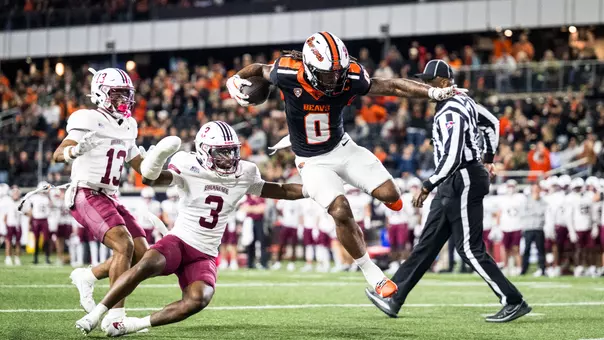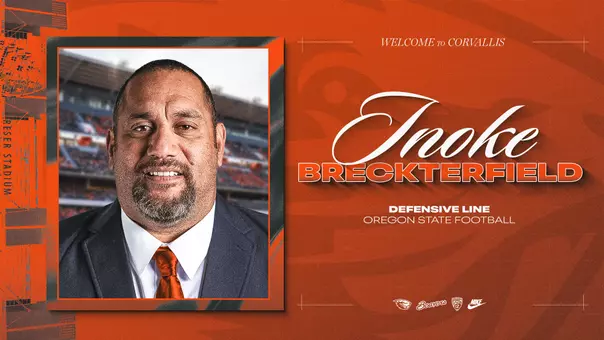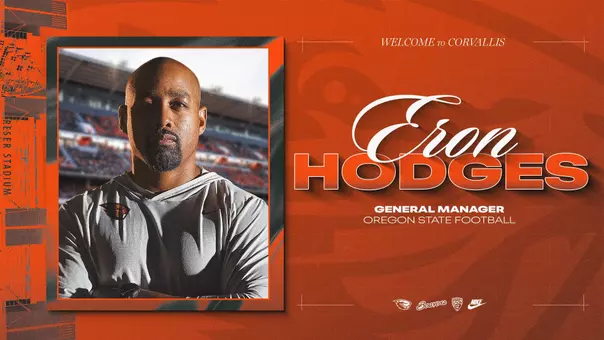
John Landforce remembers one of the most memorable seasons.
Remembering the Men of Roses -- "The sense of inspiration is a healthy feeling"
November 28, 2016 | Football
This is the seventh installment of a seven-part series written by Kip Carlson about the 1941 Oregon State football team that played in the 1942 Rose Bowl. The '42 Rose Bowl is the only one in the history of the storied game that was played outside of Southern California due to fears of an attack on the U.S. West Coast following Pearl Harbor.
This story also appeared in the football game-day program Saturday, Nov. 26 vs. Oregon.
During a break in the first half of Oregon State's game against Washington State on October 29, Reser Stadium's north end zone was filled with dozens of people celebrating the 75th anniversary season of the 1941 Beavers earning the school's first-ever Rose Bowl berth: sons and daughters, grandchildren and other family members of players from that long-ago squad.
And, in the center of that group, sporting an orange cowboy hat and a mile-wide smile, the team's one surviving member: Andy Landforce.
Landforce, now 99, was a reserve back for those Beavers, who traveled over 3,000 miles to beat second-ranked Duke 20-16 on its home field in the "transplanted" 1942 Rose Bowl. The game was moved from Pasadena after Japan's attack on Pearl Harbor left the West Coast vulnerable and military officials felt a gathering of 100,000 football fans would be an inviting target for enemy bombers.
The 1941 Beavers reached national prominence after being tabbed for a second-division finish in the Pacific Coast Conference. But early-season wins over PCC favorites Washington and Stanford, four straight November shutouts and beating Oregon 12-7 in Eugene secured the Rose Bowl bid.
Seven-and-a-half decades later, Landforce has no trouble identifying what made those Beavers successful.
"One of the things was teamwork; another one was friendship," Landforce said in a Veterans Day interview at his Corvallis home. He noted that Oregon State head coach Lon Stiner scheduled the Beavers' first game as a trip to Southern California.
"So that as a group of men that were playing football, by the time we got to the train ride and sitting on the train and arrived in California, we were more like a team," Landforce said. "The fellowship, the joking back and forth – 'Aw, c'mon, hit 'em harder than that,' you know, and so on."
That ease with each other, Landforce felt, made it easier for the Beavers to listen to Stiner and assistant coaches Jim Dixon and Hal Moe.
"And then when you could do the things the coaches instructed you to do, you experienced a sense of achievement. And that made you a better ballplayer," Landforce said.
Stiner, who was 38 during the 1941 season, was the youngest head coach in the PCC but was already in his ninth season as Oregon State's head coach. His teams had already created several memorable moments, including the 1933 "Iron Men" tying USC to break its 25-game winning streak, unveiling the "Pyramid Play" to block kicks and the 1939 Beavers going 9-1-1 and winning the Pineapple Bowl.
"I never heard Lon Stiner or Jim or Hal Moe ever bawl anybody out. You went on a positive plane. Lon Stiner himself and his wife (Caroline) were smooth, reasonable people, the aura of respect and admiration for them prevailed. And he had a human touch; when he talked to me, he could make me feel like I was something," benchwarmer Landforce said with a laugh.
Center Quentin Greenough, who earned All-America honors that season, was once quoted as saying Stiner had a knack for working with young men.
"A great knack because you felt comfortable to be yourself with him," Landforce said. "You did not feel fearful that you would make mistakes. You just played the game. And he was the kind of coach who, when you did make a mistake, he says, 'You haven't failed; you have learned now. Just keep going."
Landforce played just one season for Oregon State. He had been elected student body president for his senior year; Stiner found Landforce had played football in high school and approached him about being on the team to spark support among the student body. Landforce – who figures he was "165 pounds, dripping wet" at the time – did see enough action during the season to carry the ball three times.
In the aftermath of Japan's attack on Pearl Harbor, when teammate Jack Yoshihara was banned from the trip to the Rose Bowl because of governmental travel restrictions on Americans of Japanese descent, it fell to Landforce and acting OSC President F.A. Gilfillan to lobby the campus ROTC commandant on Yoshihara's behalf.
"This was absolutely unacceptable in our feeling," Landforce said. "Here's a member of our football team; just because he has a Japanese ancestry, but he's a United States citizen."
Landforce and Gilfillan stated their positon; Landforce remembers thinking that with the help of some arguments supplied by other students, he'd made a pretty good case. Seventy-five years later, Landforce could still see and hear the commandant's response: "Gentlemen, the United States of America is at war with Japan. This order is from the President of the United States and it will be carried out. Good day."
Recalled Landforce: "You talk about an emotional time and being wronged, and you can't do anything about it … I can remember that some of my friends were also emotionally disturbed. I know I didn't hardly sleep for a while That was the other thing – my digestion didn't work. I was wronged; because I was so sincere in what I was doing, it was just a real blow."
Yoshihara didn't return to school at Oregon State, but was included in his team's inductions into the State of Oregon Sports Hall of Fame and the Oregon State University Sports Hall of Fame. In 2008, Yoshihara was one of several students of Japanese ancestry to receive honorary degrees from OSU after not having been able to complete their studies because of the internment of Japanese-Americans during World War II.
The month between Pearl Harbor and the Rose Bowl was spent trying to balance excitement about the game and the team's achievements with the uncertainty over what the future held beyond January 1.
"I think we struggled with them," Landforce said of the Beavers' response to the two emotions. "I think we had to get a hold of ourselves and say, 'Hey, we've got this responsibility and so on in Durham, and get your mind off what's ahead.'"
Landforce was on the Rose Bowl trip, but after starting to suit up before the game he was directed to the press box to serve as a spotter for the legendary sportscaster Bill Stern on the national radio broadcast of the Beavers' upset that shocked the nation.
After the win, Stiner was rumored to be in line for several coaching jobs, including at Yale and his alma mater Nebraska, but received a bonus and a raise to stay at Oregon State. Along with Greenough's All-America selection, he and halfback Don Durdan and quarterback George Peters earned All-Coast honors.
Of the 31 players on Oregon State's Rose Bowl roster, 29 went on to serve in the United States military during World War II. Landforce rose to the rank of company commander as part of the supply lines for Gen. George Patton as he rolled across Europe; he doesn't offer many details of his service but said, "I count my blessings. It's an absolute miracle that I made it, that I didn't end up getting killed at least three times … I mean, when you have a bullet come so close to your head that you can feel the wind from the wake of a bullet that goes by, man oh man, that makes an indelible impression on your life."
Not all his teammates were so fortunate. Everett Smith was a reserve left halfback; his touchdown at California provided the game's only points in one of Oregon State's key wins that season. Smith's biography in the Rose Bowl press guide read:
"180 pounds, sophomore in agriculture, from Coquille, Oregon. Two more years. Earned first letter this season. Has been outstanding this year for punt returns and for his hard driving line play. As a sophomore has done a good job as a passer and a punter. Coaches look for him to develop into a great backfield man."
But, in his excellent recent book on the 1942 Rose Bowl and its participants' paths through the ensuing years, author Brian Curtis writes that instead, Smith enlisted in the U.S. Marine Corps in 1942 – 3rd Battalion, 2nd Marines. On November 20, 1943, he was killed as the 2nd Marines tried to take Betio, a small island in the Tarawa atoll. He was the only Oregon State player from that 1941 team killed in battle in World War II; three Duke players also died.
"A heck of a good ballplayer and a nice guy," Landforce recalls of Smith.
As young men and women from across the country banded together to fight, at least twice former foes were united on the same side of the battlefield.
During the Battle of the Bulge in late 1944, Lt. Col. Wallace Wade, an artillery commander, found himself in a foxhole sharing some coffee with an infantryman named Stan Czech; they soon realized Wade had been coaching Duke in the 1942 Rose Bowl while Czech was playing tackle for Oregon State. Beaver guard Frank Parker and Duke reserve quarterback Charlie Haynes met while both commanding rifle companies in the 88th Infantry Division; in the fall of 1944, Haynes was struck by shrapnel in Italy and Parker carried him down a hill to an aid station, likely saving his life.
In another connection, Duke's quarterback during that game, Tommy Prothro, would coach Oregon State to Rose Bowls after the 1956 and 1964 seasons.
After the war, Landforce returned to Oregon State as an Extension Service agent, working in Wallowa County for several years before returning to the main campus for a long career as the agency's specialist in wildlife management. He raised a family with his late wife, Evelyn, whom he met at Oregon State; he continues to live in his longtime home not far from Reser Stadium and attend Beaver sporting events. Landforce easily, happily recalls his student days and his Rose Bowl teammates.
"So those are good memories that come up at a time like this," Landforce said. "And on Veterans Day, I have been thinking about some of those. I catch myself: I don't want to think about aspects of the war; I want to think about some of these positive things that keep you going.
"The sense of inspiration is just a healthy feeling."
This story also appeared in the football game-day program Saturday, Nov. 26 vs. Oregon.
During a break in the first half of Oregon State's game against Washington State on October 29, Reser Stadium's north end zone was filled with dozens of people celebrating the 75th anniversary season of the 1941 Beavers earning the school's first-ever Rose Bowl berth: sons and daughters, grandchildren and other family members of players from that long-ago squad.
And, in the center of that group, sporting an orange cowboy hat and a mile-wide smile, the team's one surviving member: Andy Landforce.
Landforce, now 99, was a reserve back for those Beavers, who traveled over 3,000 miles to beat second-ranked Duke 20-16 on its home field in the "transplanted" 1942 Rose Bowl. The game was moved from Pasadena after Japan's attack on Pearl Harbor left the West Coast vulnerable and military officials felt a gathering of 100,000 football fans would be an inviting target for enemy bombers.
The 1941 Beavers reached national prominence after being tabbed for a second-division finish in the Pacific Coast Conference. But early-season wins over PCC favorites Washington and Stanford, four straight November shutouts and beating Oregon 12-7 in Eugene secured the Rose Bowl bid.
Seven-and-a-half decades later, Landforce has no trouble identifying what made those Beavers successful.
"One of the things was teamwork; another one was friendship," Landforce said in a Veterans Day interview at his Corvallis home. He noted that Oregon State head coach Lon Stiner scheduled the Beavers' first game as a trip to Southern California.
"So that as a group of men that were playing football, by the time we got to the train ride and sitting on the train and arrived in California, we were more like a team," Landforce said. "The fellowship, the joking back and forth – 'Aw, c'mon, hit 'em harder than that,' you know, and so on."
That ease with each other, Landforce felt, made it easier for the Beavers to listen to Stiner and assistant coaches Jim Dixon and Hal Moe.
"And then when you could do the things the coaches instructed you to do, you experienced a sense of achievement. And that made you a better ballplayer," Landforce said.
Stiner, who was 38 during the 1941 season, was the youngest head coach in the PCC but was already in his ninth season as Oregon State's head coach. His teams had already created several memorable moments, including the 1933 "Iron Men" tying USC to break its 25-game winning streak, unveiling the "Pyramid Play" to block kicks and the 1939 Beavers going 9-1-1 and winning the Pineapple Bowl.
"I never heard Lon Stiner or Jim or Hal Moe ever bawl anybody out. You went on a positive plane. Lon Stiner himself and his wife (Caroline) were smooth, reasonable people, the aura of respect and admiration for them prevailed. And he had a human touch; when he talked to me, he could make me feel like I was something," benchwarmer Landforce said with a laugh.
Center Quentin Greenough, who earned All-America honors that season, was once quoted as saying Stiner had a knack for working with young men.
"A great knack because you felt comfortable to be yourself with him," Landforce said. "You did not feel fearful that you would make mistakes. You just played the game. And he was the kind of coach who, when you did make a mistake, he says, 'You haven't failed; you have learned now. Just keep going."
Landforce played just one season for Oregon State. He had been elected student body president for his senior year; Stiner found Landforce had played football in high school and approached him about being on the team to spark support among the student body. Landforce – who figures he was "165 pounds, dripping wet" at the time – did see enough action during the season to carry the ball three times.
In the aftermath of Japan's attack on Pearl Harbor, when teammate Jack Yoshihara was banned from the trip to the Rose Bowl because of governmental travel restrictions on Americans of Japanese descent, it fell to Landforce and acting OSC President F.A. Gilfillan to lobby the campus ROTC commandant on Yoshihara's behalf.
"This was absolutely unacceptable in our feeling," Landforce said. "Here's a member of our football team; just because he has a Japanese ancestry, but he's a United States citizen."
Landforce and Gilfillan stated their positon; Landforce remembers thinking that with the help of some arguments supplied by other students, he'd made a pretty good case. Seventy-five years later, Landforce could still see and hear the commandant's response: "Gentlemen, the United States of America is at war with Japan. This order is from the President of the United States and it will be carried out. Good day."
Recalled Landforce: "You talk about an emotional time and being wronged, and you can't do anything about it … I can remember that some of my friends were also emotionally disturbed. I know I didn't hardly sleep for a while That was the other thing – my digestion didn't work. I was wronged; because I was so sincere in what I was doing, it was just a real blow."
Yoshihara didn't return to school at Oregon State, but was included in his team's inductions into the State of Oregon Sports Hall of Fame and the Oregon State University Sports Hall of Fame. In 2008, Yoshihara was one of several students of Japanese ancestry to receive honorary degrees from OSU after not having been able to complete their studies because of the internment of Japanese-Americans during World War II.
The month between Pearl Harbor and the Rose Bowl was spent trying to balance excitement about the game and the team's achievements with the uncertainty over what the future held beyond January 1.
"I think we struggled with them," Landforce said of the Beavers' response to the two emotions. "I think we had to get a hold of ourselves and say, 'Hey, we've got this responsibility and so on in Durham, and get your mind off what's ahead.'"
Landforce was on the Rose Bowl trip, but after starting to suit up before the game he was directed to the press box to serve as a spotter for the legendary sportscaster Bill Stern on the national radio broadcast of the Beavers' upset that shocked the nation.
After the win, Stiner was rumored to be in line for several coaching jobs, including at Yale and his alma mater Nebraska, but received a bonus and a raise to stay at Oregon State. Along with Greenough's All-America selection, he and halfback Don Durdan and quarterback George Peters earned All-Coast honors.
Of the 31 players on Oregon State's Rose Bowl roster, 29 went on to serve in the United States military during World War II. Landforce rose to the rank of company commander as part of the supply lines for Gen. George Patton as he rolled across Europe; he doesn't offer many details of his service but said, "I count my blessings. It's an absolute miracle that I made it, that I didn't end up getting killed at least three times … I mean, when you have a bullet come so close to your head that you can feel the wind from the wake of a bullet that goes by, man oh man, that makes an indelible impression on your life."
Not all his teammates were so fortunate. Everett Smith was a reserve left halfback; his touchdown at California provided the game's only points in one of Oregon State's key wins that season. Smith's biography in the Rose Bowl press guide read:
"180 pounds, sophomore in agriculture, from Coquille, Oregon. Two more years. Earned first letter this season. Has been outstanding this year for punt returns and for his hard driving line play. As a sophomore has done a good job as a passer and a punter. Coaches look for him to develop into a great backfield man."
But, in his excellent recent book on the 1942 Rose Bowl and its participants' paths through the ensuing years, author Brian Curtis writes that instead, Smith enlisted in the U.S. Marine Corps in 1942 – 3rd Battalion, 2nd Marines. On November 20, 1943, he was killed as the 2nd Marines tried to take Betio, a small island in the Tarawa atoll. He was the only Oregon State player from that 1941 team killed in battle in World War II; three Duke players also died.
"A heck of a good ballplayer and a nice guy," Landforce recalls of Smith.
As young men and women from across the country banded together to fight, at least twice former foes were united on the same side of the battlefield.
During the Battle of the Bulge in late 1944, Lt. Col. Wallace Wade, an artillery commander, found himself in a foxhole sharing some coffee with an infantryman named Stan Czech; they soon realized Wade had been coaching Duke in the 1942 Rose Bowl while Czech was playing tackle for Oregon State. Beaver guard Frank Parker and Duke reserve quarterback Charlie Haynes met while both commanding rifle companies in the 88th Infantry Division; in the fall of 1944, Haynes was struck by shrapnel in Italy and Parker carried him down a hill to an aid station, likely saving his life.
In another connection, Duke's quarterback during that game, Tommy Prothro, would coach Oregon State to Rose Bowls after the 1956 and 1964 seasons.
After the war, Landforce returned to Oregon State as an Extension Service agent, working in Wallowa County for several years before returning to the main campus for a long career as the agency's specialist in wildlife management. He raised a family with his late wife, Evelyn, whom he met at Oregon State; he continues to live in his longtime home not far from Reser Stadium and attend Beaver sporting events. Landforce easily, happily recalls his student days and his Rose Bowl teammates.
"So those are good memories that come up at a time like this," Landforce said. "And on Veterans Day, I have been thinking about some of those. I catch myself: I don't want to think about aspects of the war; I want to think about some of these positive things that keep you going.
"The sense of inspiration is just a healthy feeling."
Introducing Oregon State Head Coach JaMarcus Shephard
Monday, December 01
Oregon State Football Interviews: November 25, 2025
Tuesday, November 25
Oregon State Football Press Conference: Interim Head Coach Robb Akey (Nov. 24, 2025)
Monday, November 24
Oregon State Football Interviews: November 12, 2025
Wednesday, November 12















